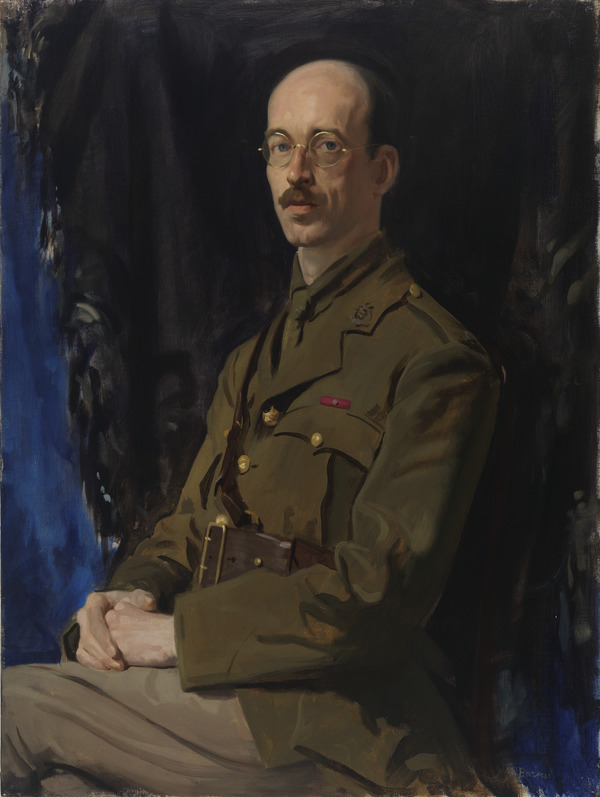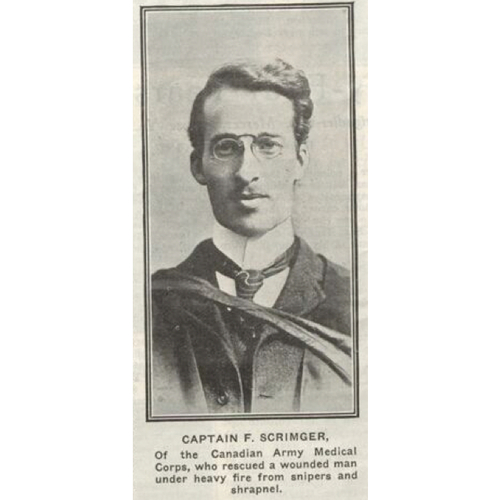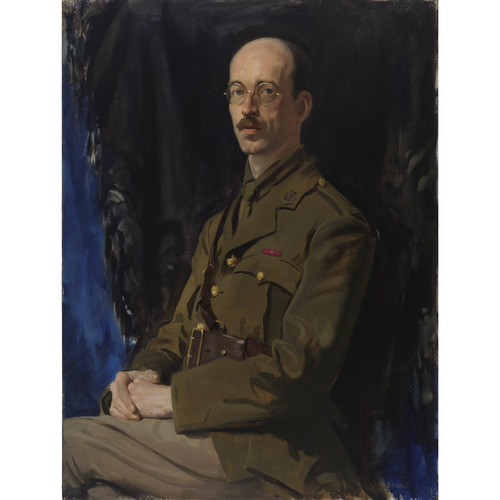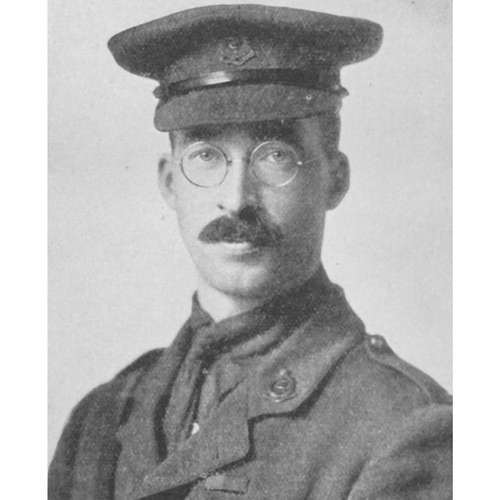
Source: Courtesy of Wikimedia Commons
SCRIMGER, FRANCIS ALEXANDER CARRON, surgeon, author, army officer, and university professor; b. 8 Feb. 1880 in Montreal, son of John Scrimger and Charlotte Catherine Gairdner; m. 5 Sept. 1918 Ellen Eason Carpenter (Emmerson), a nurse, in London, England, and they had three daughters and one son; d. 13 Feb. 1937 in Montreal.
Scrimger (or Scrymgeour) is a name of French origin that recognizes sword skills and is believed to have been given to Alexander Carron, a 12th-century Scottish knight. Francis (Frank) Scrimger’s paternal grandparents emigrated from Scotland to Galt (Cambridge), Upper Canada, where his father was born and raised. His mother, of Scottish and Welsh stock, was born and raised in Bayfield. Frank was the second of their five children, all born in Montreal, where John Scrimger was the pastor of St Joseph Street Presbyterian Church until about 1883, when he became a professor of divinity at the Presbyterian College of Montreal. Although they were anglophone, both parents spoke French and made sure that Frank became fluent in the language. When Frank was growing up, several controversies surrounded his father, who in 1890 presented a paper before the Protestant Ministerial Association of Montreal on errors in the moral teaching of the Jesuits, and three years later participated in the prosecution of his fellow minister and teacher, John Campbell*, for heresy. Campbell won his appeal to the Synod of the Presbyterian Church of Canada and continued his rivalry with John Scrimger for control of the college, but in 1904 Scrimger was appointed its principal.
Frank Scrimger was educated at the High School of Montreal and McGill University, from which he received a ba in biology with first-class honours in 1901. During one of the summer breaks, he had taken part in the Geological Survey of Canada in Manitoba. On one occasion he remained behind with the camp cook, who was too ill to move. He nursed the man back to health from what he later believed to be either typhoid fever or appendicitis. When he returned home, he was determined to study medicine instead of law, his father’s choice. His elder brother, John Tudor, known as Tudor, became a Presbyterian minister, moved to Scotland, and changed the spelling of his last name to Scrymgeour. Their sister Anna Marks took up the suffragist cause in 1903 and would be a lifelong campaigner for women’s rights. After the First World War, Frank would support his sister in her efforts to establish women’s suffrage in Quebec. Despite his upbringing, as an adult Frank was not very religious.
After graduating as a physician from McGill in 1905, Scrimger spent four years on the house staff of the Royal Victoria Hospital (RVH). During his first year he studied surgical pathology, and his teachers included John McCrae*. He was then assigned to the service of the founding head of surgery, James Bell. Among the assistant surgeons to whom Scrimger reported was Edward William Archibald*. Scrimger spent a year in Europe conducting postgraduate studies in Berlin, Dresden, and Vienna. He learned to speak German fairly well and worked with August Bier, who was known for the development of local anesthesia using cocaine. Upon his return to Montreal in 1910, he was appointed demonstrator in surgery at McGill and clinical assistant in surgery at the RVH. He also established a private practice. The next year he published an article on the use of X-rays in the diagnosis of gastric diseases, the first of his many academic papers, in the inaugural issue of the Journal of the Canadian Medical Association.
Scrimger joined the Canadian Army Medical Corps in 1912 as a lieutenant, and two years later he was appointed medical officer of the Montreal Heavy Brigade, Canadian Garrison Artillery. Shortly after the outbreak of the First World War, he was deployed with 14th Infantry Battalion (Royal Montreal Regiment) while McGill’s offer of providing a hospital was being considered. After a few temporary postings he was assigned to an advanced dressing station in a farmhouse, nicknamed Mousetrap Farm, at Wieltje, Belgium, on the road from Saint-Julien (Sint Juliaan) to Ypres.
On 22 April 1915, the first day of the second battle of Ypres [see Sir Arthur William Currie; Sir Edwin Alfred Hervey Alderson*], George Gallie Nasmith* visited Scrimger at the dressing station. Nasmith, Toronto’s sanitation officer, had been assigned to a laboratory for testing water to ensure that it was safe to drink. The two men were walking nearby when they witnessed the first use of gas warfare by the Germans. From their vantage point they were able to observe its weight and colour, and upon tasting it they noted its harmful effects. Together they decided it was chlorine. Nasmith returned to his laboratory with a sample and confirmed their suspicion. (Nasmith’s report would be the first to correctly identify the agent.) Meanwhile, Scrimger improvised by ordering the men on his line to use urine-soaked cloths as makeshift gas masks.
From 22 to 25 April, Scrimger’s location received prolonged direct bombardment. He supervised evacuation of all the wounded, including the last patient, whose head injury made the task more difficult. On the fourth day, Scrimger had to move the man to a crater and protect him with his own body for many hours before there was a lull in the attack and they could be rescued. For his actions during the evacuation, he was awarded the Victoria Cross at a ceremony in London in July.
Before leaving for England, Scrimger had visited McCrae, who was in charge of another dressing station near Saint-Julien. He later told his family that McCrae had allowed him to read a discarded draft of “In Flanders fields.” Scrimger responded to McCrae’s dismissal of the poem by urging him to publish it.
On 31 Dec. 1915 Scrimger was posted to the No.1 Canadian General Hospital in Étaples, France, where one of his fingers was cut when a patient knocked a scalpel out of his hand during surgery. The wound became infected and he was evacuated to England for treatment. Injuries of this type were often fatal in the era before antibiotics. Fortunately, he recovered, but the finger had to be amputated.
In March 1917 Scrimger returned to France and was assigned to the McGill-staffed No.3 Canadian General Hospital at Boulogne-sur-Mer, to which McCrae had been transferred. Two months later Scrimger was named chief surgeon of the hospital. There he met operating-room nurse Ellen Carpenter (born Emmerson, she had taken the last name of her adoptive father), who would become his wife. When he met up with his brother Tudor during the war, they played a practical joke on Ellen. Frank introduced her to Tudor, remarking on the different spelling of his surname, but did not reveal that they were brothers until months later.
When a request was received to reinforce a casualty clearing station east of Amiens in March 1918, Scrimger assembled a team that included Nurse Carpenter. They worked incessantly until the order to evacuate was received. Scrimger, his team, and an Irish medical officer remained, however, to care for about 50 wounded men. They managed to get the patients to a road crowded with retreating artillery troops and persuaded the soldiers to carry their comrades to safety, some upon the gun carriages. Scrimger and his colleagues returned to the station to retrieve their equipment, which they wheeled on stretchers for 20 miles to reach their line. Frank and Ellen returned safely to London, and about two months before the armistice they were married there.
After Scrimger returned to Montreal in the spring of 1919, he served as assistant surgeon at the RVH and continued to practise privately. Known for quick diagnoses and efficient work, in 1921 he was appointed staff lecturer in clinical surgery at McGill. He was a founding fellow of the Royal College of Physicians and Surgeons of Canada in 1929, and around 1930 he became a member of the American Surgical Association. In 1931 he was named assistant surgeon at the Children’s Memorial Hospital (CMH) and assistant professor of surgery at McGill. The following year he was promoted to the position of surgeon at the RVH and in 1933 to surgeon-in-chief of the CHM, a post he occupied for two years. When in 1932 he removed a darning needle from the heart of a patient sent from Kitchener, Ont., newspapers in Toronto and Boston reported on the successful operation. He published academic papers, book chapters, and a surgical handbook. According to his friend and colleague Edward Archibald, Scrimger’s greatest contributions to medicine were his research on post-operative collapse of the lung, chronic lung abscess, and dilation of the oesophagus.
With such a demanding schedule, Scrimger was overworked and his health suffered. In 1934 he diagnosed his own heart attack while travelling from Montreal to Philadelphia and telegraphed ahead to a friend in Albany, N.Y., to arrange for an ambulance to meet the train. After his recovery he continued to work. In 1936 he succeeded Archibald as chief of surgery at the RVH and chair of McGill’s department of surgery. Less than a year later Scrimger suffered a second heart attack, this time fatal.
An exceptionally dedicated physician, Francis Scrimger was one of only two Canadian-born medical officers to receive the Victoria Cross, the highest award for valour, in the First World War. During the Allied advance across Europe in the Second World War, Scrimger’s son, Alexander (Alec) Carron, was able to visit the site of his father’s heroic actions during the second battle of Ypres. On 28 Oct. 1944 Alec was killed in action in the Netherlands.
Francis Alexander Carron Scrimger wrote or co-authored several chapters in surgical textbooks as well as about 20 articles in academic journals such as the Journal of the Canadian Medical Assoc. (Toronto), the Arch. of Internal Medicine (Chicago), the American Journal of Surgery (New York), Surgery, Gynecology & Obstetrics (Chicago), the Annals of Surgery (Philadelphia), and the Journal of Thoracic Surgery (St Louis, Mo.) between 1911 and 1936. An extensive list of Scrimger’s publications is available at the DCB/DBC.
Ancestry.com, “England & Wales, civil registration marriage index, 1916–2005”: www.ancestry.ca (consulted 1 May 2018). FD, Presbyterian Calvin (Montreal), 8 Feb. 1880; Presbyterian Saint Andrew and Saint Paul (Montreal), 13 Feb. 1937. LAC, R611-439-X; RG 150, Acc. 1992–93/166, box 8744-41. MUA, MG 2019; MG 2034. Globe, 24 June 1915, 21 June 1932. Globe (Boston), 21 June 1932. New York Times, 15 Feb. 1937. E. W. Archibald, “Francis Alexander Carron Scrimger, 1880–1937,” Annals of Surgery, 107 (January–June 1938): 159–60. Canadian medical lives, ed. T. P. Morley (24v. to date, Toronto and Oxford, Eng., 1989– ), 5 (Suzanne Kingsmill, Francis Scrimger: beyond the call of duty, 1991). G. H. Cassar, Trial by gas: the British army at the second battle of Ypres ([Lincoln, Nebr.], 2014). “[Dr. Francis Alexander Carron Scrimger, V.C.],” Canadian Medical Assoc., Journal, 36 (January–June 1937): 322–23. W. D. Howell, “Colonel F. A. C. Scrimger, V.C.,” Canadian Medical Assoc., Journal, 38 (January–June 1938): 279–81. John Scrimger, Jesuit morals: a paper on the errors in the moral teaching of the Jesuits, read before the Protestant Ministerial Association of Montreal (Montreal, 1890). Standard dict. of Canadian biog. (Roberts and Tunnell), vol.2.
Cite This Article
Vivian McAlister, “SCRIMGER, FRANCIS ALEXANDER CARRON,” in Dictionary of Canadian Biography, vol. 16, University of Toronto/Université Laval, 2003–, accessed December 24, 2025, https://www.biographi.ca/en/bio/scrimger_francis_alexander_carron_16E.html.
The citation above shows the format for footnotes and endnotes according to the Chicago manual of style (16th edition). Information to be used in other citation formats:
| Permalink: | https://www.biographi.ca/en/bio/scrimger_francis_alexander_carron_16E.html |
| Author of Article: | Vivian McAlister |
| Title of Article: | SCRIMGER, FRANCIS ALEXANDER CARRON |
| Publication Name: | Dictionary of Canadian Biography, vol. 16 |
| Publisher: | University of Toronto/Université Laval |
| Year of publication: | 2023 |
| Year of revision: | 2023 |
| Access Date: | December 24, 2025 |





